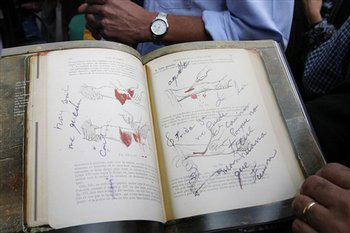Mexican Prosecutors Probe Possible Frida Fakes
 Catherine E. Shoichet - Associated Press Catherine E. Shoichet - Associated Press
go to original
September 23, 2009


| | Art professor James Oles, top, and an unidentified lawyer show pages to the press from the book entitled "Finding Frida Kahlo" at the Attorney General's office in Mexico City, Tuesday, Sept. 22, 2009. The custodians of Mexico's artist Frida Kahlo's work filed a lawsuit against whomever may be responsible for the publication of this book, as well as another entitled "The Labyrinth of Frida Kahlo," claiming the objects and artwork shown in the books are forgeries. (AP/Marco Ugarte) |  |
Mexico City — Mexican federal prosecutors said Tuesday they are investigating a claim that more than 1,000 items attributed to artist Frida Kahlo were forged.

The Diego Rivera and Frida Kahlo Trust filed a complaint saying signed paintings, notes and drawings featured in two recent art history books are fake, the Attorney General's Office said.

"We must stop the commercialization of false works," said Hilda Trujillo, director of the Diego Rivera and Frida Kahlo Museums.

The works in question come from a private collection and appear in two books, "Finding Frida Kahlo" and "The Labyrinth of Frida Kahlo: Death, Pain and Ambivalence."

Kahlo, who died in 1954, was known for her tortured self-portraits and a tumultuous relationship with Mexican muralist Diego Rivera, who she married.

Katharine Myers at Princeton Architectural Press, the publisher of "Finding Frida Kahlo," said it plans to keep selling the book.

"In the book, we state that the pieces have not been 100 percent authenticated, that it's still being researched," Myers said.

Members of the trust and some art history scholars hope the publishers will take the books off the market, saying at a news conference in Mexico City that the consequences could be severe if the books keep being sold.

"This will infect all the studies of Frida Kahlo with a virus, with bad, inaccurate information," said James Oles, an assistant professor at Wellesley College who has joined with other art historians in criticizing the publications.

The owners of the art, according to Oles, say the collection came from five boxes that Kahlo gave to a carpenter.

Oles said items in the collection include significant spelling errors, low-quality paintings and other suspicious details.

"What woman signs her recipes? No one, unless they want to sell them," he said.

Associated Press writer Istra Pacheco contributed to this report. |



